- Home
- Tamora Pierce
Tempests and Slaughter Page 19
Tempests and Slaughter Read online
Page 19
There were also several pieces like branches or sticks thickly coated in sand. One of them formed the shape of an O. He stretched his hand out over a slender shape. His hand tingled, and the hairs on the back of his fingers and wrist stood on end.
“Mages of long ago called them fulgurite,” Faziy said over his shoulder. Arram flinched. He didn’t even know the teacher had come up to him. “They are what happens when lightning strikes sand—well, very strong lightning. Beneath the surface it goes solid. We only know this when the sand on top washes off or is blown away.” She rested a hand on his shoulder. “Go on. Pick it up. It was fused a long time ago; it won’t hurt you.”
Arram gently wrapped his hand around a branch of it. He feared it would crumble to pieces, but it was as hard as stone. The tiny prickles raced up his arm again. “There’s lightning still in it!” he exclaimed, letting go.
She chuckled, a lovely, low sound in his ear. “That’s your imagination, my lad. The lightning was gone from these pieces centuries ago. Ages ago. You’ve been to the museum?” Arram nodded. “You’ve seen the skeletons of the giant lizards and birds, the huge elephants? It’s all from that time.”
Arram opened his mouth to argue, and closed it. Whether she had finished her classes to be a master or no, she was close to being one. It was not his place to argue. He did ask, “Why is that round one so different? The others just look like sticks.”
Faziy laughed. “Oh, that! I made that one!”
Arram gawped at her; even Preet squeaked.
Faziy looked down her nose at the little bird. “You’re not even supposed to be able to make sounds like that.” She looked at Arram. “I didn’t say it was easy.”
“You said it requires lightning!” Now it was time for him to squeak.
She smiled. “And it does. I am lucky enough that the lightning snakes find me amusing. When they’re about, sometimes I can coax them to help me do things. But it took years of practice, and knowledge, and study. Half of the time it doesn’t work, because they’re willful creatures.” She flicked the bird on the beak with a finger. “Most of the mages who try it incinerate themselves.”
Arram only grasped one idea out of all that she said. “L-l-lightning snakes?”
Faziy sighed and settled into one of the chairs at the room’s big table. She motioned for Arram to sit in another.
“Among the tribes, it is known that there is magic in far more things than the school mages believe,” she told him. “Well, lightning snakes ride with lightning in the season of storms. Some think they are the lords of lightning and give them names. Some think they are simply creatures like the immortals of old, the centaurs and Stormwings. I think they are more like gods. If there’s a big storm when we have class, I’ll try to show you some. Now, where did you end when you took charms the last time?”
Arram left the class dazed and filled with wonder. Never mind that he had made a botch of a twisted straw-and-wire charm for good crops. The thought of snakes made of lightning enchanted him. He couldn’t wait to see one!
He arrived early to his next class, which gave him private time to introduce Dagani to the sleeping Preet. Dagani eyed the bird and indicated a place where Arram could place her pouch out of the way as he worked.
“Lindhall told Faziy and me about her over lunch,” the master said. “I understand you just came from Faziy’s class.”
Arram nodded. Abruptly he said, “She told me about lightning snakes. Have you ever seen any?”
“No,” Dagani replied slowly, tracing an outline of something on a worktable. It rose, turning and twisting as Arram watched, fascinated. “But the desert shamans create their seemings in the fire. They want the seemings to find the real snakes, and call them to help the warriors in battle.” The outline fattened, turned jagged, and grew golden in color. Jagged wings sprouted in its sides, two pairs. The head formed, long and narrow, with red-orange hot coal eyes. It turned its head toward the door as Ozorne, Varice, and Tristan entered. They’d been chattering until they saw the lightning snake. As it rose to stand on the tip of its tail, flapping its wings, they froze.
The lightning snake hissed. Ozorne and Tristan immediately called up protective shields for themselves and Varice, creating a conflict—their Gifts did not mesh, and they had not thought to make allowance for another mage’s work. Sparks flew along with vile-smelling smoke, making the lightning snake screech. Arram called a breeze that took both smell and sparks out the still-open door, while with a hand gesture Dagani erased her simulacrum.
“I would say we have several lessons for today,” she told her students as the last of the smoke dissolved. “Lesson the first: learn if protection is even needed. Lesson the second: learn if the magics of your allies are compatible with yours. If they are not, work the charm that makes yours compatible with theirs. How many of you read the introduction in The Upper Academy: General Magic?”
Arram and Varice raised their hands. Ozorne and Tristan found someplace else to look.
Dagani rubbed her head. “The word to reveal if the magics of others are compatible with yours, as well as the sigils that make your Gift temporarily compatible with that of those nearby—both of these things are in the introduction. They are in the introduction because they are intended to introduce you to working magic with other mages. We shall practice these things, the four of you, while you decide which living creature you will create as your first simulacrum. Arram, do not choose a lightning snake,” she said when he opened his mouth.
Arram closed it. He’d been going to try just that.
“The larger the choice, the more power it consumes. The more magical the choice, the more power it consumes,” the master warned. “The simulacrum of a lightning snake would kill a beginner before that beginner even completed it.” Dagani looked at them all. “Choose a seat.” She pointed a scarlet-tinted fingertip at Tristan. “Your name?”
“Tristan Denane, Master,” he said, meeting her gaze.
“Tristan, tell me the word which reveals whether another’s Gift is compatible with your own. If you don’t know it, look it up.”
By the end of their time all four agreed—once they were outside the classroom—that the lovely, gracious Dagani was one of the hardest teachers they’d ever had, though Arram was willing to wager on Yadeen against her. Dagani had yet to throw a wooden ball at him.
It was a relief to change into sandals and his rough woolen shirt and breeches and report to Hulak in one of his glass winter houses. If the master was impressed with Preet, he neglected to mention it. Instead he instructed her to eat no seeds unless he gave them to her himself. He then fed her so much seed Arram feared she might burst after her lunch.
Sebo’s reaction was a little different from those of the other teachers. By then the bird was awake and happy to ride Arram’s shoulder once more. When the old master emerged from her home, she stopped in front of Arram and eyed his passenger. As she did so, a frown grew upon her face, blossoming into a scowl of fearsome proportions. She smashed the foot of her staff into the sandy dirt.
“Enzi!” she bellowed with more volume than one of her years should have been able to manage.
The crocodile god was there. I was napping was all he got to say before she gave him a frightful blow across the back with her stick.
Arram darted for what protection he and Preet could find in the hut. From its shelter, hiding behind the open door, he could only hear cracks and a few words—“Student…danger…mischief…troublemaker”—when the great crocodile wasn’t roaring. Finally there was a long silence. Arram peered through the gap below the top hinge, only to encounter a glittering, baleful black eye.
“And you were fool enough to say yes to him!” Sebo hissed. “Come outside!”
Arram didn’t think. “I don’t want to,” he replied. Pondering his reaction afterward, he was still convinced only a fool would want to face Sebo in that mood.
She slid her fingers through the crack and grabbed him by the nose. “Outside,�
� she ordered. She released him.
Arram emerged, rubbing his poor, abused nose. Enzi was still present. The remains of the shattered staff lay on his broad back. He glared at Sebo. I am not the worst thing that will happen to your precious boy, he told her.
“Please don’t say that,” Arram begged. “If you won’t tell me why—”
I will not. You have a destiny. You aren’t allowed to know it.
“Take back the bird,” Sebo ordered.
I dare not, Enzi retorted, just as Arram cried, “No!” and Preet shrieked. Swiftly Preet began to scold, but she was not looking at Enzi. She was looking at Sebo.
Finally the old woman pointed at her. “Very well, very well, be silent, or I will make you be silent!”
Preet gave a last squawk. Arram tucked her into the corner of his elbow and murmured to her that everything would be fine.
To Enzi, Sebo said, “If harm comes to him because of you, I will make you pay.”
Yes, you irascible mortal. And also, I owe you an ebony stick for the one I graciously allowed you to break on my poor back. Enzi vanished, leaving a hollow in the dirt and the remains of Sebo’s staff.
“You didn’t have to be so angry with him,” Arram protested. “I don’t mind looking after her. Neither do my masters.”
“Because you’re a boy, and daft by nature,” Sebo grumbled. “And they are air-dreaming fools! I was going to teach you how to dowse for water today, but I have a headache now. Come in. You can read about dowsing, and we’ll try it tomorrow if it doesn’t rain. And you…” Moving quickly, she scooped Preet out of Arram’s elbow hold. “You are not to distract him. You may sing me to sleep.”
To Arram’s surprise, Preet did just that. She nearly did it for him as well. He was just starting to nod off when the bell for the end of classes rang out. Arram sighed with relief. He didn’t know about Preet, but he was ready for a nap after his brief night and the day’s excitement.
One early February Saturday Arram came back from supper with his friends to find a note on his door from Master Cosmas.
Dear Arram,
Family business calls me away for a week. I have arranged for Master Chioké to join your instruction with that of Ozorne’s.
Be sure to thank Chioké. It is unusual for one master to welcome another’s students into his workroom, and Chioké is stricter concerning these matters than most. He must value Ozorne’s opinion, or mine, or both, to permit this.
—Cosmas
“You know I love you, to agree to be up at such a disgusting hour,” Ozorne announced when Arram arrived for class the next morning. His friend was leaning against the workroom wall, observing his approach with bleary eyes. “Do you even know how many of those things you have in the air?”
“Four,” Arram said. He’d been practicing juggling as he walked from Yadeen’s to Chioké’s.
“Aren’t you worried you’ll hit Preet?” Ozorne yawned hugely.
Preet, who sat on top of Arram’s head, cheeped as if to say she was fearless. Tired as he was, Ozorne chuckled. “I think she would take on armies if she could.”
Chioké bustled up the path, looking fresher and more alert than Arram. He halted before his door and bowed slightly to Ozorne. “Your Highness, good morning.” He eyed Arram. “Must you bring the blackbird?”
Arram blinked, startled: unlike his regular teachers, Chioké did not seem to realize Preet was no ordinary bird.
Ozorne glanced at him, then explained, “Master Lindhall is conducting an experiment, Master Chioké, on how birds raised with humans act differently from those that are captured wild. All of Arram’s masters, even Cosmas, gave him permission to keep Preet with him. And she isn’t at all disruptive.”
Chioké sketched the sigil that opened the door. “Other masters or no, if that bird makes a mess, it goes. I keep a serious workroom for magecraft, not a birdcage.”
Cross, Arram followed Ozorne and his teacher inside. If anyone should be picky about such things, it was Ramasu, who fashioned medicines in his workroom.
They had just begun to eat the cold fruit and cheese that Ozorne provided—nothing like the warm breakfast Cosmas always supplied—when Chioké said, “What has the old man got you studying, Draper?”
Arram blinked and swallowed his mouthful of cheese. Old man? He means Master Cosmas! “C-control, sir,” he stammered, shocked.
“Control over what?” the master asked.
“Kitchen fires. Forge fires if the smiths don’t mind. Starting and stopping hearth and brush fires,” Arram explained.
Chioké and Ozorne traded looks; Chioké began to laugh. “Mithros and Smith’s God defend us, this is the work of children and old men!” he cried. Only those who had been initiated into the rites of the smiths had the right to address their god by name. Others who attempted to do so regretted it. “We study war magic here—the kind of magic that changes empires! That’s what your power is for, young fellow!”
Arram looked at Ozorne, who was grinning. Surely Ozorne knew that the sort of magic taught by Cosmas would stop the kinds of fires that plagued cities and farms. Cosmas even had hopes that Arram might one day guide the lava that spilled out of Southern volcanoes, though Arram thought the master was overreaching.
“So much for staying indoors, at least for now. Come along, you two—let’s see what our young friend can do when he’s let off his leash. Step lively. The foretellers call for rain later.” Chioké led the way outside again.
They crossed the Tradesmen’s Road to a large grassless space in a field. Arram had been here often with friends to watch older fire magic students create displays for holidays. Large parties and games between the university’s schools were held here, with stone risers on either side of the field to accommodate viewers.
Chioké pointed to a tall stack of wood placed to one side of the area. “Draper, get one of those. Bring it over to where I’ll be standing.”
Arram hesitated. Would it do any good to protest? He didn’t think so. Instead he put his book bag on the riser Ozorne had chosen and handed Preet to his friend. She cheerfully ran up his arm and began to pick through the strings of beads in his hair.
“Should I give her one?” he called after Arram.
“Don’t. She’ll eat them,” Arram called back as he trotted to the stacks.
“Is he joking?” he heard Chioké ask Ozorne.
He chose a three-foot-high round chunk of wood—he identified it as cork oak—evened off on the bottom. Chioké walked five hundred feet into the center of the bare ground, where he scratched an X into the dirt before he returned to Ozorne. Arram got the message: he was to place the piece of wood there. Ozorne’s master was starting to remind him of some of the older students who still plagued him.
“Do you know the spell to project fire, as you would throw a spear?” Chioké asked when Arram returned to the other two.
“I’ve done it at targets,” Arram replied quietly. He felt his fingers tingle. His Gift knew he was about to handle fire. He was never sure whether he liked the feeling. At least he’s not asking me to light candles, he thought.
The mage pinched his nose. “As a war mage you must force it, of course. Concentrate your will, call the flame from your Gift, work the spell without faltering. Demand that it appear within that wood!”
Arram thought he should mention the risks. “Sir, it isn’t that I can’t do the spell—”
“No debate,” Chioké said, his heavy brows snapping together. “Do it!”
Taking a breath, Arram closed his eyes and prayed, Mithros, please shine on me.
The sky was covered with thick clouds; in the distance he felt thunder roll. The older he was, whether he was indoors or out, he had begun to feel any thunder around him, not only overhead. He’d told no one, not even Ozorne and Varice. He feared they might think he was putting on airs, or running mad.
Do it and get it over with, he ordered himself. Before the lightning comes.
He drew the spell-parts together in hi
s mind—for simpler spells, it was considered more mage-like not to say them aloud—and bound them with his Gift. There was a roaring in his ears. Power shot through his veins. It was gone.
So was the wood, burned to ashes instantly. Arram couldn’t see his spell, but he felt it still rushing on. If he hadn’t yanked his hands down, driving its power into the earth—where it burned a track in the dirt almost to the edge of the clearing—it would have shot into the brush on the far side.
For a moment there was silence. Then Chioké yelled, “You call that control?”
“Master, look at his target,” Ozorne said. “Or what’s left of it.”
Chioké walked over to the ash mark where the chunk of wood had been, and kicked at it. Then he went to the woodpile, working a spell that lifted another piece of wood, a thicker and longer piece, into the air. He sent it to a point six hundred feet from where the two youths stood, and with a flick of the fingers, he drove it into the ground.
“Hold your position there!” he shouted. He walked quickly to the stone seats and climbed up three rows, then crossed his arms over his chest.
“Does he want me to do it again?” Arram asked Ozorne.
“I think he does,” his friend murmured. “He loves to look…mage-like.”
“What do you wait for, the immortals’ return?” Chioké bellowed. “Once more.”
The third time he demanded that Arram speak the spell aloud so he could ensure he was adding nothing to it. Ozorne had to stuff Preet into Arram’s book bag because she screeched in outrage at Chioké’s tone toward Arram.
The fourth time Chioké held Arram’s hands, earning himself a burn when they grew too hot. If he had not been a fire mage, it would have been much worse. As it was, he had to suffer the indignity of using Ozorne’s burn salve.

 Lady Knight
Lady Knight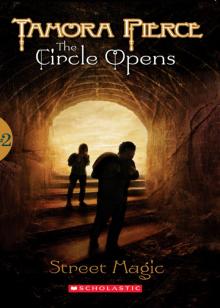 Street Magic
Street Magic Bloodhound
Bloodhound Magic Steps
Magic Steps Alanna: The First Adventure
Alanna: The First Adventure Emperor Mage
Emperor Mage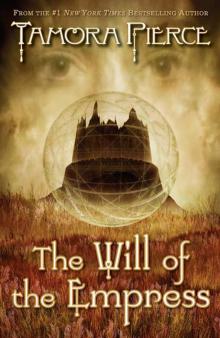 The Will of the Empress
The Will of the Empress The Realms of the Gods
The Realms of the Gods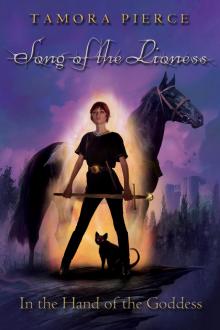 In the Hand of the Goddess
In the Hand of the Goddess Tris's Book
Tris's Book Cold Fire
Cold Fire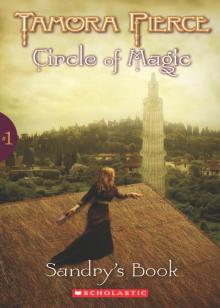 Sandry's Book
Sandry's Book Wild Magic
Wild Magic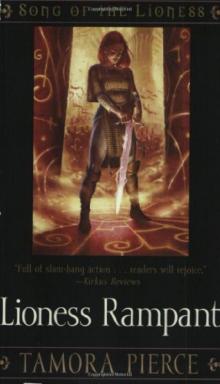 Lioness Rampant
Lioness Rampant The Woman Who Rides Like a Man
The Woman Who Rides Like a Man First Test
First Test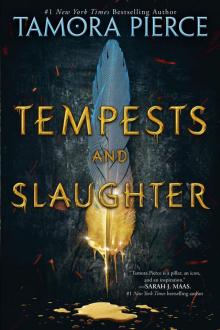 Tempests and Slaughter
Tempests and Slaughter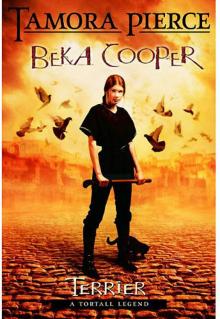 Terrier
Terrier Trickster's Queen
Trickster's Queen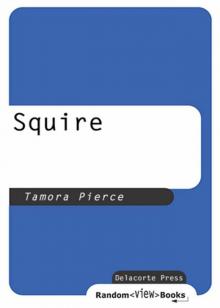 Squire
Squire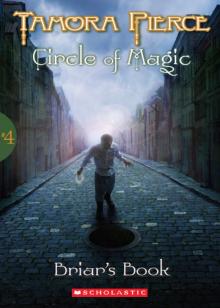 Briar's Book
Briar's Book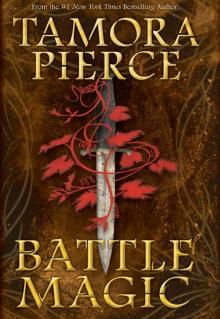 Battle Magic
Battle Magic Page
Page Melting Stones
Melting Stones Wolf-Speaker
Wolf-Speaker Mastiff
Mastiff The Song Of The Lioness Quartet #1 - Alanna - The First Adventure
The Song Of The Lioness Quartet #1 - Alanna - The First Adventure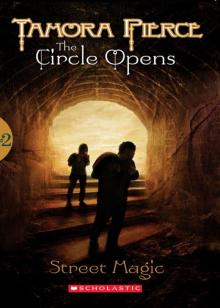 The Circle Opens #2: Street Magic: Street Magic - Reissue
The Circle Opens #2: Street Magic: Street Magic - Reissue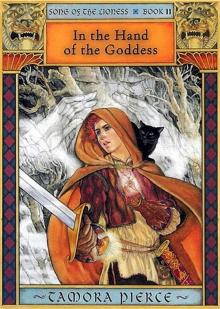 Tortall 1 - Song Of The Lioness #2 - In The Hand of the Goddess
Tortall 1 - Song Of The Lioness #2 - In The Hand of the Goddess Protector of the Small Quartet
Protector of the Small Quartet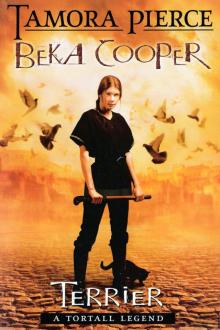 Beka Cooper 1 - Terrier
Beka Cooper 1 - Terrier Alanna
Alanna Trickster's Choice
Trickster's Choice Circle Opens #03: Cold Fire
Circle Opens #03: Cold Fire In the Hand of the Goddess (The Song of the Lioness)
In the Hand of the Goddess (The Song of the Lioness)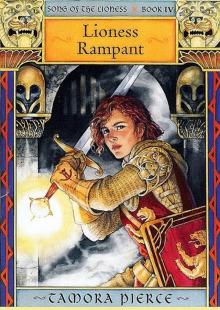 Song of the Lioness #4 - Lioness Rampant
Song of the Lioness #4 - Lioness Rampant Young Warriors
Young Warriors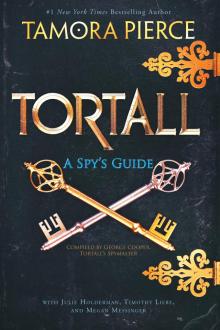 Tortall
Tortall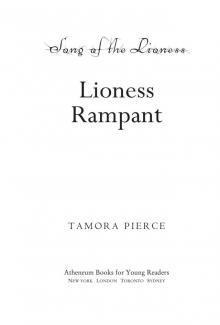 Lioness Rampant (Song of the Lioness)
Lioness Rampant (Song of the Lioness) Melting Stones (Circle Reforged)
Melting Stones (Circle Reforged) The Circle Opens #4: Shatterglass
The Circle Opens #4: Shatterglass